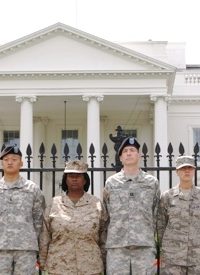
On Tuesday, October 19, U.S. District Judge Virginia Phillips of California, who overturned the military’s “Don’t Ask, Don’t Tell” policy, rejected the government’s request to halt her order enforcing her decision. For the first time in U.S. history, the military is accepting openly gay recruits.
Immediately following the Pentagon’s announcement, military service members previously discharged for being gay began the process to reenlist. One such member is Dan Choi, a 29-year-old Iraq War veteran.
After Judge Phillips’ injunction last week, Will Rodriguez, a former Marine discharged under the policy in 2008 returned to an Army recruiting office to reenlist. However, he was told that the office had not yet received word from the Pentagon about how to proceed, and could not yet reenlist him.
With Judge Phillips rejecting the government’s stay request yesterday, however, Rodriguez plans to return to the recruiting office on Friday.
Fox News reports, “The movement to overturn the 1993 Clinton-era law gained speed when President Barack Obama campaigned on its repeal. The effort stalled in Congress this fall, and found new life last month when U.S. District Judge Virginia Phillips declared it unconstitutional.”
According to Judge Phillips’ decision in Log Cabin Republicans v. United States of America, “Don’t Ask, Don’t Tell” violated due process and the freedom of speech of homosexual military men and women.
In her 85-page decision, she wrote, “The act discriminates based on the content of the speech being regulated. It distinguishes between speech regarding sexual orientation, and inevitably, family relationships and daily activities, by and about gay and lesbian service members which is banned, and speech on those subjects by and about heterosexual service members, which is permitted.”
A month after her September ruling, Judge Phillips granted a permanent injunction which prohibited the federal government from further enforcing or applying “Don’t Ask, Don’t Tell” and from applying further regulations against any person under its jurisdiction.
Government lawyers followed the injunction order with a stay request, asserting that Phillips’ order would be disruptive to troops as they serve in war. The lawyers also contended that the military requires time to adequately prepare the troops for the transition.
Fox News explains that the judge was unconvinced: “Phillips has said her order does not prohibit the Pentagon from implementing those measures. She said the government failed to prove any harm to troops because the policy has been lifted. The judge also said safeguarding constitutional rights outweighed the government’s unproven concerns of the order’s impact on military readiness and unit cohesion.”
In her ruling, Phillips explains, “Defendants merely conclude, without explanation, that ‘confusion and uncertainty’ will result if the injunction remains in place. Thus, defendants have failed to establish they are likely to suffer irreparable injury if a stay is not granted.”
While the Defense Department declares it will adhere to the judge’s ruling, military recruiters have been told to inform recruits that the policy could be reversed at any time. For this reason, gay rights groups are warning military service members to keep their sexual orientations to themselves in case the policy is reinstated.
In the meantime, however, Pentagon spokeswoman Cynthia Smith asserts that recruiters were given top-level orders to accept applications from recruits who admit that they are gay.
As expected, the ruling has led to further confusion, as homosexual military service members are uncertain of the future. One service member asserts, “The military has financially trapped us,” after noting that he could be on the ropes for $200,000 if he were to be discharged.
The same service member confirms that gay military personnel are slowly revealing their orientation to friends and peers in the military, while simultaneously trying to keep their secret from military officials.
Opponents of the ruling point to the confusion as an example of why the judge should have accepted the White House’s stay request.
“It’s only logical that a stay should be granted to avoid the confusion that is already occurring with reports that the Pentagon is telling recruiters to begin accepting homosexual applications,” explains Tony Perkins, president of the Family Research Council.
Douglas Smith, spokesman for U.S. Army Recruiting Command, asserts that the judge’s decision changes very little about the recruitment process, as recruiters did not ask applicants about their sexual orientation prior to the ruling.
“If they were to self-admit that they are gay and want to enlist, we will process them. U.S. Army Recruiting Command is going to follow the law, whatever the law is,” says Smith.
However, news of the judge’s ruling has not reached all recruiting stations. Marine Sgt. Timothy Chandler in Pensacola, Florida claims he has not been given any direction or orders following the ruling. “As far as we are concerned, everything is the same,” he concludes. “The policy hasn’t changed.”
Experts predict that this most recent decision to reject the government’s stay request will bring the decision to the 9th Circuit Court of Appeals in San Francisco, where it will likely be affirmed.
Likewise, the White House asserts that its court actions will not undermine President Obama’s efforts to repeal the ban through Congress.
Military officials continue to urge Congress to suspend efforts to repeal the policy until the completion of an internal Pentagon review, expected to be completed in December.
Photo: In this April 16, 2010 picture, members of the military stand together after they handcuffed themselves to the fence outside the White House during a protest for gay rights: AP Images




